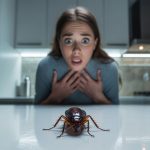Most of us have experienced it at some point—you switch on the kitchen light at night, and a cockroach scurries across the floor. Your heart skips a beat, your body freezes, and a wave of disgust or fear rushes through you. But for some, this reaction is much more intense and persistent, developing into a genuine phobia.
Referred to as katsaridaphobia, the fear of cockroaches is a widespread issue that can deeply disrupt everyday routines and overall well-being.
In this article, we’ll dive deep into why cockroaches evoke such strong reactions, the psychological and biological roots of this fear, its impact on daily living, and effective ways to overcome it.
What Exactly Is Katsaridaphobia?
The official name for a cockroach phobia is katsaridaphobia, a term that comes from the Greek word katsarida, which translates to “cockroach.”
Unlike a mild dislike or aversion, this phobia triggers an intense, irrational fear when someone encounters a cockroach—or even when they merely think about one.
For some, the fear is manageable, causing discomfort. For others, the reaction can be overwhelming, leading to panic attacks, avoidance behaviors, and anxiety that spills over into different aspects of life.
Why Do Cockroaches Scare Us So Much?
At first glance, cockroaches are small, harmless insects. They don’t bite or sting, and most species aren’t dangerous to humans. Yet they consistently rank as one of the most feared household pests. Why is that?
1. Their sudden, unpredictable movements
Cockroaches are fast, darting across floors or walls unexpectedly. This unpredictability makes them seem more threatening than they really are.
2. Their association with filth and disease
Cockroaches are commonly found in unsanitary places such as drains, trash bins, and sewers.
Over time, they’ve become symbolic of dirt, decay, and contamination, triggering disgust and fear.
3. Deep-rooted evolutionary responses
Some researchers believe our aversion to cockroaches is rooted in evolution. Their fast movements and tendency to carry bacteria may have historically signaled a health threat, making humans instinctively wary.
4. Cultural influence and social learning
Movies, media, and even childhood experiences amplify our fear. If someone grows up seeing adults scream at cockroaches, they may internalize that reaction.
Common Symptoms of Cockroach Fear

The fear of cockroaches goes beyond simple dislike. Symptoms can range from mild unease to severe physical reactions, such as:
-
Racing heartbeat
-
Sweaty palms
-
Trembling or shaking
-
Nausea or stomach discomfort
-
Feeling frozen or unable to move
-
Intense urge to escape the situation
-
Panic attacks in extreme cases
These symptoms often occur instantly when a cockroach appears and may persist long after the insect is gone.
How This Phobia Affects Daily Life
For someone with katsaridaphobia, cockroaches are not just pests; they’re a source of constant dread. This can affect daily routines and mental health in surprising ways.
Avoidance behaviors
People may refuse to enter certain rooms, avoid basements, or decline visiting homes in tropical areas where cockroaches are common.
Sleep disturbances
Fear of cockroaches crawling at night can keep individuals awake, leading to insomnia.
Impact on hygiene and cleaning habits
Some become overly cautious, obsessively cleaning or checking every corner, while others may feel hopeless and overwhelmed.
Emotional stress
Living in fear creates chronic anxiety, which can reduce overall quality of life.
Is It Just Fear or Disgust?
Not everyone who dislikes cockroaches has a phobia. In fact, much of the reaction stems from disgust. Cockroaches are often seen as dirty, slimy, and gross, which naturally triggers avoidance.
The difference lies in intensity. While disgust fades once the insect is gone, phobic fear lingers, creating anxiety about future encounters and sometimes even invading dreams.
Psychological Roots of the Fear

To understand katsaridaphobia better, it helps to look at its psychological foundations.
Childhood experiences
Many phobias trace back to early memories. A frightening incident—like being startled by a cockroach flying onto you—can plant the seed of lifelong fear.
Conditioning and learned responses
If a child repeatedly sees parents or siblings reacting with fear, they may adopt the same behavior, creating a cycle that continues into adulthood.
Underlying anxiety disorders
In some cases, cockroach fear connects to broader issues like generalized anxiety disorder or obsessive-compulsive tendencies.
The Role of Biology and the Brain
Phobias stem from the brain’s amygdala, the area that detects threats and sets off the body’s fear response.
When someone with katsaridaphobia sees a cockroach, their amygdala may overreact, signaling danger even when none exists.
Additionally, the sympathetic nervous system kicks in, releasing adrenaline and preparing the body for “fight or flight.” That’s why the reaction feels so immediate and hard to control.
Coping Strategies for Daily Encounters
What can you do if you have a fear of cockroaches but still need to live in a world where they exist?
1. Practical prevention
Seal cracks, keep food sealed, and maintain cleanliness to reduce the chances of seeing cockroaches at home.
2. Grounding techniques
When panic strikes, grounding exercises like focusing on your breath or touching nearby objects can help calm your body.
3. Gradual exposure
Facing fear little by little—first through pictures, then videos, then controlled encounters—can reduce sensitivity over time.
4. Support from loved ones
Having someone present can provide reassurance and make the situation more manageable.
Professional Treatment Options

For severe phobias, professional help is often the best path forward.
Cognitive Behavioral Therapy (CBT)
CBT helps reframe negative thought patterns, teaching individuals to challenge irrational fears.
Exposure therapy
Under the guidance of a therapist, patients are slowly introduced to cockroach-related stimuli in safe environments until the fear diminishes.
Medication
Anti-anxiety drugs or beta-blockers may be prescribed in severe cases to manage physical symptoms.
Hypnotherapy and relaxation techniques
Some find alternative therapies like hypnosis, meditation, or mindfulness helpful in reducing fear intensity.
When Fear Becomes a Metaphor
Interestingly, cockroaches are often used metaphorically in literature and conversation. They symbolize survival, resilience, and sometimes, repulsion. Think of how people say, “They’ll outlive us all.” This dual image—both terrifying and unkillable—may add to their eerie reputation.
In a way, fearing cockroaches is like fearing shadows. The insect itself is small and fragile, but the idea of it looms much larger in our minds.
Overcoming the Fear: A Step-by-Step Path
While overcoming katsaridaphobia takes time, it’s entirely possible. Here’s a roadmap many find useful:
-
Acknowledge the fear – Denial only makes it stronger.
-
Educate yourself – Learning about cockroaches demystifies them.
-
Use exposure techniques – Start small, progress gradually.
-
Practice relaxation – Deep breathing, yoga, or meditation can help.
-
Seek professional help if needed – Therapists can provide structured guidance.
Every small victory—like calmly looking at a photo—adds up over time.
Building a Healthier Relationship with Insects
This doesn’t mean you’ll ever love cockroaches, but shifting from terror to tolerance is a realistic goal. After all, cockroaches are part of the ecosystem, playing a role in breaking down organic matter. Seeing them as part of nature rather than monsters can soften the fear.
FAQs About Fear of Cockroaches
1. Is fear of cockroaches common?
Absolutely, it ranks among the most widespread fears when it comes to insects.
Many people experience discomfort, and a significant number develop full-blown phobia.
2. Can cockroaches really harm humans?
While cockroaches rarely bite or sting, they are notorious for carrying germs and provoking allergies, reinforcing their unpleasant reputation.
3. Is katsaridaphobia linked to other mental health issues?
It can be. Those who struggle with anxiety disorders or obsessive-compulsive behaviors are generally at a higher risk of developing phobias.
4. What’s the quickest way to calm down during a cockroach encounter?
Focus on breathing slowly and grounding yourself. Reassure yourself that the cockroach isn’t actually dangerous.
5. Can this fear ever be fully cured?
For many, yes. With therapy and gradual exposure, the fear can be greatly reduced or eliminated, allowing people to live more comfortably.
Conclusion
The fear of cockroaches may seem irrational to outsiders, but for those who live with it, the struggle is very real. Katsaridaphobia isn’t just about bugs—it’s about anxiety, control, and the way our brains interpret threats. The good news is that with patience, coping strategies, and sometimes professional support, this fear can be managed and even overcome.
Just like flicking on a light sends cockroaches scurrying away, shining knowledge on your fears can make them less daunting.










